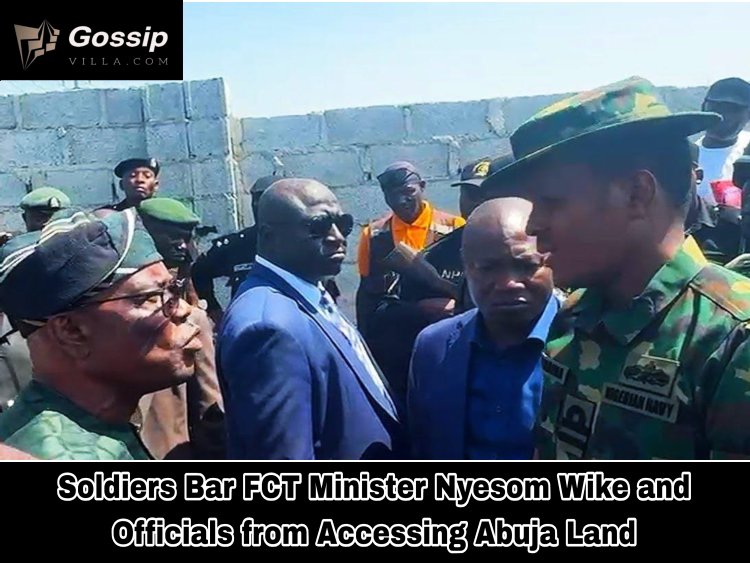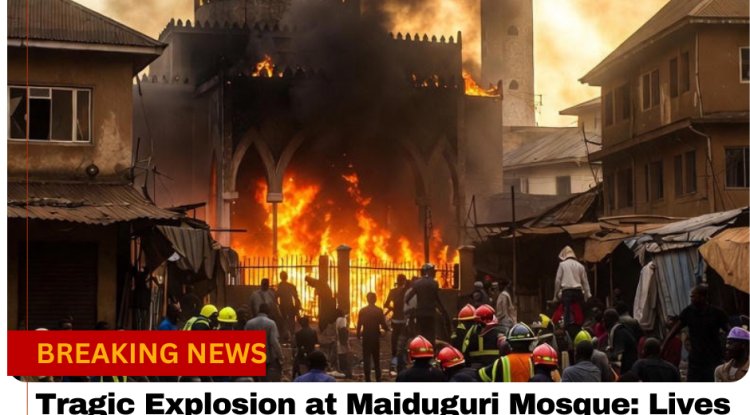Soldiers Bar FCT Minister Nyesom Wike and Officials from Accessing Abuja Land
A tense confrontation unfolded in Abuja as soldiers blocked FCT Minister Nyesom Wike and FCTA officials from accessing a disputed Gaduwa land. The clash, involving armed security personnel and government officials, has raised serious questions about land ownership, civilian authority, and military interference in governance.

Soldiers Bar FCT Minister Nyesom Wike and Officials from Accessing Abuja Land
In a tense and unprecedented confrontation on Monday, November 11, 2025, soldiers prevented the Minister of the Federal Capital Territory (FCT), Nyesom Wike, and officials of the Federal Capital Territory Administration (FCTA) from accessing a disputed parcel of land in the Gaduwa District of Abuja. The incident, which quickly escalated into a physical and verbal standoff, has sparked wide national debate on the rule of law, the limits of military authority, and transparency in land administration within the nation’s capital.

The Incident
According to multiple eyewitness and media reports, Minister Wike, accompanied by top FCTA officials from the Department of Development Control, arrived at Plot 1946, Gaduwa District, for an inspection and enforcement visit. The land in question, measuring approximately 30 hectares, had been the subject of a prolonged ownership dispute between the FCTA and certain serving and retired military officers.
Upon arrival, the minister’s convoy was stopped by armed soldiers who had barricaded the main access route to the site. Eyewitnesses confirmed that military vehicles were positioned strategically to block entry, forcing the minister and his team to halt.
Minister Wike reportedly confronted the officers, demanding to know under whose authority the soldiers were deployed to obstruct a lawful government inspection. “Show me the document that authorizes you to be here,” Wike was quoted as saying during the exchange. The confrontation, captured on video and widely circulated online, showed the minister visibly angered as he insisted that no institution, including the military, was above the law.
Background of the Dispute
The land in question was initially allocated to a group of senior and retired military personnel several years ago. However, the FCTA, under Wike’s leadership, allegedly revoked the allocations after a review suggested that the parcel was either misused or irregularly acquired.
Sources within the FCTA indicated that the plot had been designated as a green area or recreational zone in the Abuja Master Plan, but was later converted into mixed-use development land without proper authorization. Following the revocation, new rights of occupancy were reportedly issued to other parties, a move that sparked outrage among affected officers and led to the deployment of soldiers to protect the site.
Security Confrontation
During the confrontation, voices were raised as the minister accused the officers of undermining civilian authority. “You cannot intimidate government officials with guns. The FCT is not a military barracks,” he declared, according to reports by Premium Times and Vanguard Newspaper.
The situation became tense when one of the soldiers allegedly advanced toward the minister’s security aides, prompting intervention by other personnel to prevent escalation. Wike was said to have immediately contacted the Chief of Defence Staff, who reportedly intervened to calm the situation.
No casualties were recorded, but the incident caused temporary chaos and delayed the minister’s inspection exercise.
Legal and Administrative Concerns
Analysts have described the confrontation as symptomatic of deeper governance challenges in Abuja’s land management system. Over the years, the FCT Administration has struggled with overlapping claims of ownership, political interference, and unauthorized conversions of designated green zones to residential and commercial use.
Legal experts warn that the deployment of armed soldiers to obstruct duly authorized civilian officials raises constitutional concerns regarding the separation of powers and the supremacy of civil authority. Many have called for a judicial review of the revocation and re-allocation processes to restore transparency and public confidence.
Reactions and Public Response
The incident has generated widespread reactions from citizens, civil society groups, and commentators across the country. Supporters of the minister applauded his firmness, describing the confrontation as a necessary test of civilian control over public resources. Others, however, cautioned that the FCTA must ensure its revocation exercises are lawful, transparent, and free of political favoritism.
A statement reportedly under consideration by the Defence Headquarters is expected to clarify whether the soldiers acted under formal orders or through individual discretion. The FCTA is also expected to release an official report outlining the sequence of events and next steps in the dispute resolution process.
Implications for Governance
The standoff at Gaduwa underscores the urgent need for reform in Abuja’s land administration framework. It exposes the tension between civilian oversight and military privilege in post-allocation land management — a sensitive issue that has persisted since the city’s establishment.
If unresolved, the confrontation could set a precedent for future conflicts between regulatory authorities and security institutions, potentially undermining the sanctity of the rule of law in the Federal Capital Territory.
READ MORE ON : Wike: Demonstrations Are Allowed, But I Won’t Be Blackmailed
The altercation between FCT Minister Nyesom Wike and military personnel at the Gaduwa land site reflects a broader struggle for institutional accountability in Nigeria’s governance landscape. As investigations continue, Nigerians will be watching closely to see whether justice, transparency, and respect for due process will prevail over power and privilege.
What's Your Reaction?




















